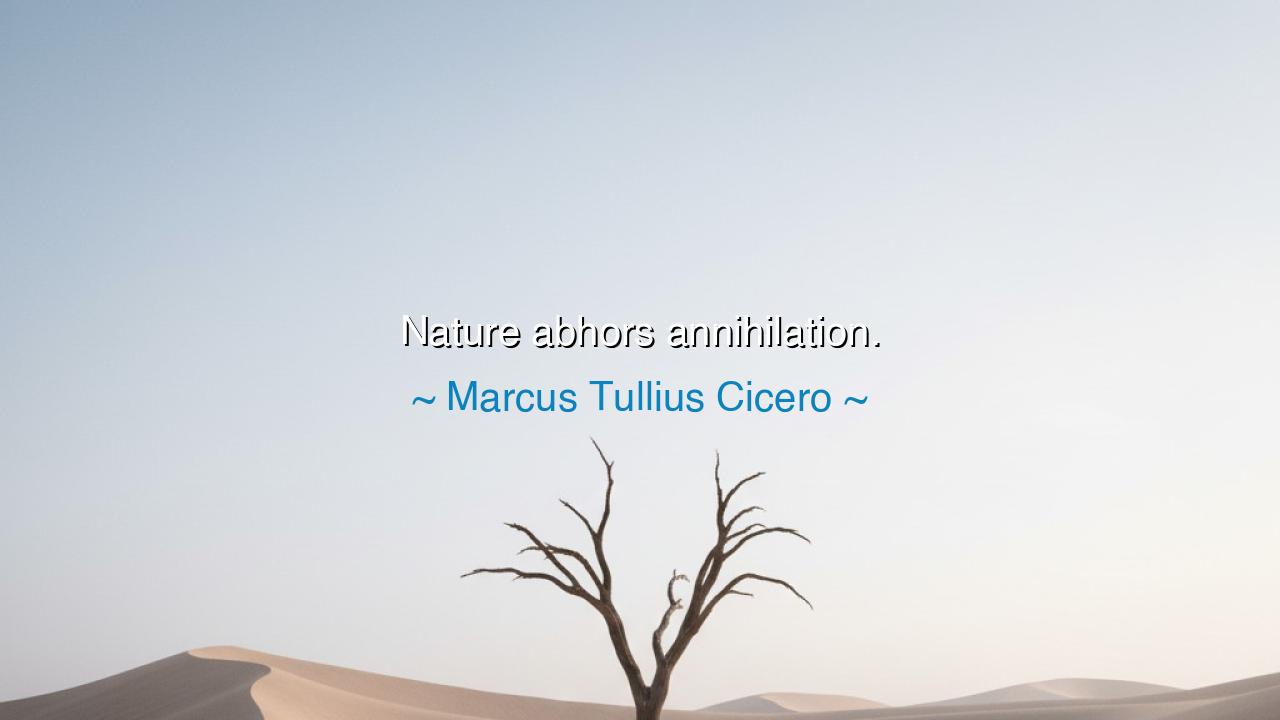
Nature abhors annihilation.






Hearken, O children of the eternal world, to the wisdom of Marcus Tullius Cicero, whose voice traverses the centuries: “Nature abhors annihilation.” In this profound declaration lies a meditation upon the persistence of life, the indestructible rhythms of the cosmos, and the enduring principle that destruction is foreign to the essence of being. Cicero, philosopher, statesman, and observer of the natural order, reminds us that all things in existence seek continuity, and that life, in its manifold forms, resists total obliteration.
The essence of this reflection is that destruction is unnatural, while continuity, transformation, and adaptation are inherent to the world. Nature does not embrace annihilation; even when faced with calamity, fire, flood, or decay, life persists in new forms, regenerates, and endures. Cicero speaks not only of physical survival but of the metaphysical truth that existence is structured to sustain itself, to transform, and to evolve, ensuring that the rhythms of the cosmos endure through time.
Consider the example of the forest after fire, such as those in Yellowstone National Park. Though flames may consume trees and soil, the ecosystem does not cease; rather, seeds germinate, grasses and shrubs emerge, and animal life returns. Life reclaims its place, demonstrating Cicero’s insight: annihilation is alien to nature, while renewal and regeneration are its guiding principles. The wisdom lies in observing that endings are seldom absolute; they are transformations, beginnings disguised as conclusions.
This teaching also illuminates the resilience of the human spirit. Like the forests, human beings endure trials, suffering, and loss, yet the drive to persist, adapt, and rebuild mirrors the principle Cicero observed in nature. Consider the life of Nelson Mandela, imprisoned for decades yet emerging to lead a nation through reconciliation and renewal. The human spirit, like the cosmos itself, abhors finality, seeking instead continuity, restoration, and growth.
Even in the realm of thought and culture, Cicero’s principle holds. Ideas, knowledge, and art may face suppression, but they are rarely destroyed; they endure in memory, record, and reinterpretation. The Renaissance, which revived classical knowledge after centuries of turmoil, exemplifies how human understanding resists annihilation. Continuity, adaptation, and transformation safeguard what seems lost, reinforcing the enduring rhythm of existence.
Cicero’s reflection also teaches humility before the natural order. To recognize that nature abhors annihilation is to see oneself as part of a continuum, not as a solitary agent capable of final destruction. While humans possess power, the laws of the cosmos and the resilience of life remind us that the world’s currents are larger than individual will. Preservation, respect, and careful stewardship align us with the enduring principles that sustain all existence.
O children of wisdom, take this teaching to heart: honor the resilience of life in all its forms, observe the cycles of destruction and renewal, and align your actions with the principles that sustain continuity. In times of adversity, remember that endings are rarely absolute; transformation and regeneration are intrinsic to existence. Cultivate patience, adaptability, and respect for the processes of life, drawing strength from the eternal rhythm that resists annihilation.
Thus, let the words of Marcus Tullius Cicero illuminate your journey: Nature abhors annihilation, and in its persistence lies the lesson for human conduct, creativity, and endurance. Embrace the continuity inherent in all things, honor the cycles of change, and find hope in the enduring principles of existence. In this awareness, life becomes both sacred and resilient, and the soul attuned to the eternal rhythm of being.
If you wish, I can also create a practical guide for cultivating resilience and alignment with nature’s continuity, inspired by Cicero’s reflection, with exercises to integrate this wisdom into daily life. Do you want me to do that?






AAdministratorAdministrator
Welcome, honored guests. Please leave a comment, we will respond soon